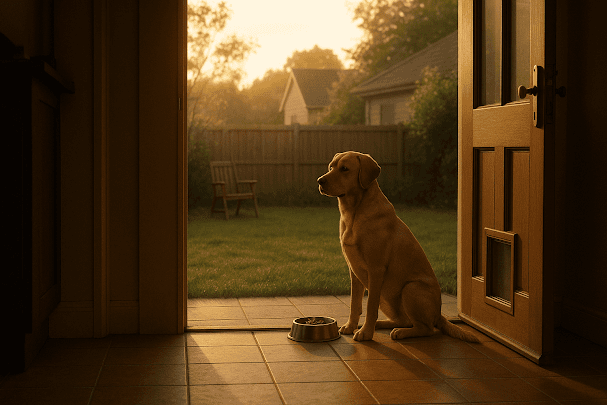A dog’s routine never changed: until everything else did.
It started with a morning like any other. The old man opened the back door, let the screen creak just a little too long, and shuffled outside to fill the bird feeder. The dog, Milo, waited patiently by the bowl, tail tapping the tiles in slow rhythm. He didn’t eat until the man returned. That was the rule.
But that morning, the door didn’t open again.
Milo sniffed around, padded out to the yard. The grass was damp. The sun not yet high. He circled once, then again, looking toward the shed. No movement. Just silence, settled like dust on memory.
He barked once. Paused. Barked again. Nothing.
So he waited.
The Clock Without Hands
Dogs don’t count time like we do. They feel it in meals missed and footsteps not heard. Milo drank from the garden tap, lay beside the porch, and dozed in the spot where the sun hit longest. The door stayed shut. The bowl stayed full.
By the second day, the mail was stacked beneath the slot. Milo nosed it, then returned to his post. At night, he scratched the door, whimpered softly, then curled into himself.
He dreamed of socks thrown lazily, of biscuits from coat pockets, of late-night mutterings and slow, contented sighs that came from the couch. Dreams that faded into the cold floor and the kind of silence that begins to hum.
He remembered the sound of the old man’s slippers dragging across the floor, the way he would always clear his throat before speaking, even if there was no one there to hear him. He remembered the creak of the recliner and the whistle he made when it was time to go outside. Milo kept turning his head at every small sound, every shifting breeze, waiting for a pattern he could recognize.
A keepsake doesn’t fill the space, but it honors what once filled it. This framed pawprint set helps preserve a presence that never truly left.
Remembering in Circles
He began to roam more. Around the fence line. To the front gate. Down the edge of the path where they used to walk every evening. Milo sniffed the bench they always passed: the one the old man sometimes sat on when his legs didn’t feel like finishing the loop.
He waited there too.
Strangers passed. Some paused, unsure. No collar, but clean. Well-fed. Tired, though. The kind of tired that doesn't come from running.
One woman offered water. He didn’t drink. A boy called to him. He didn’t move. His eyes were fixed on a place only he understood.
The wind shifted once and carried a smell he almost recognized, old tobacco and wood polish. He stood up fast, ears alert. But it was just the breeze playing tricks. He sat again, slower this time.
The House Forgot to Breathe
Inside, the curtains never changed position. The clock ticked, but no one listened. No kettle hissed. No news played too loud. The couch sat empty, a book left facedown on the arm.
Milo would press his nose to the back door every morning, as if scent could bring someone back. As if memory had weight enough to unlock things.
He wasn’t looking for food. Or play. He was waiting for the voice that said his name not like a command, but like a greeting.
In the evenings, he’d lie beside the recliner, eyes on the empty space, ears twitching at the sound of his own breath. Once, he barked at a shadow. Just once.
And Then Someone Came
It was nearly a week later. A neighbor, noticing the unopened mailbox. A call made, then another. The police, soft-spoken, cautious. They found the man slumped peacefully in his chair, a mug by his side, the television still murmuring from a world he’d no longer answer.
Milo didn’t bark. He stood by the chair and wagged, once. Then sat. Quiet. As if finally, someone else understood.
What Milo Knew All Along
They said it must’ve happened in his sleep. No struggle. No pain. Just a quiet ending in a quiet life. But Milo had felt the absence long before the world did.
Grief for a dog isn’t loud. It’s patient. It lingers in doorways and old blankets. It’s a stare held too long at an empty chair. It’s a bowl that doesn’t empty because no one says when.
Milo didn’t cry. He just stopped waiting.
And in that stillness, the house finally mourned too.
Because sometimes the one left behind notices first.
*A keepsake can’t bring someone back, but it can hold space for what mattered. This framed pawprint does just that. Available on Amazon.
Thanks for reading. Written by Jon from ClickWorldDailyI write stories for those who feel things deeply, but quietly.
If this story resonated with you, consider supporting my work. Every small gesture helps keep these words alive.
✨ Support the next chapter
If this story resonated with you, consider supporting my work. Every small gesture helps keep these words alive.
✨ Support the next chapter
Let Go of the Weight You Don’t Need
Further Reading: Other Silences That Spoke
- Somewhere in You, a Man Kept Fixing a Bike That Never Worked
Some inherit tools. Others inherit the silence behind them.
The Ones Who Tried and Disappeared
Not every act of courage is witnessed. Some vanish, but their echoes remain.She Ironed His Uniform, Then Folded the Years
Some stories of loyalty and sacrifice remain unspoken, tucked away with what’s left behind.
IMAGE CREDITS
AFFILIATE DISCLOSURE
If you choose to buy through them, we may receive a small commission. This comes at no additional cost to you. We only recommend items that hold symbolic weight in the story being told.


Comments
Post a Comment